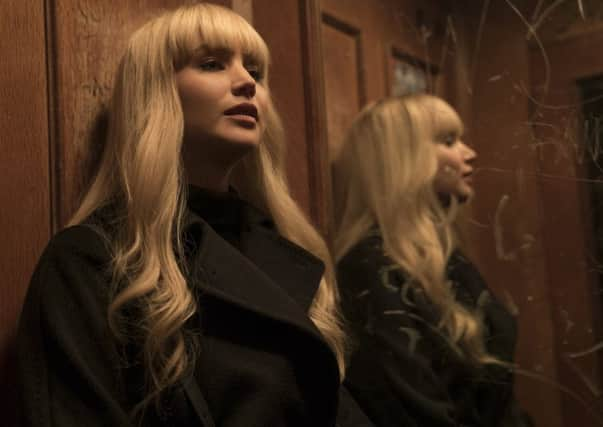Film reviews: Red Sparrow | Game Night | A Fantastic Woman | Monster Family


Red Sparrow (15) ***
Game Night (15) ****
A Fantastic Woman (15) ****
Monster Family (PG) *
Revolving around a former ballet dancer turned Russian spy, new Jennifer Lawrence thriller Red Sparrow comes on like a sexed-up John LeCarré film. But don’t get the wrong idea: it’s sexed-up only in the sense that Lawrence’s character, Dominika, has been trained in the art of deadly seduction at a facility she contemptuously describes at one point as “whore school”.
The film itself – perhaps desperate to counter any charges of exploitation – adopts a mood of grim severity regarding her profession that dominates the rest of the movie, turning what could have been a trashy, salacious action-fest into a relentlessly downbeat affair full of brutal violence and scenes of wince-inducing torture that extend beyond the British and European supporting cast dusting off their ripest Russian accents.
Advertisement
Hide AdAt the centre, though, is Lawrence, whose inscrutability is the film’s biggest asset, particularly as the spy-vs-spy plot mechanics kick into gear in the second hour when her character targets Joel Edgerton’s Nash, an American agent who is in turn targeting her. Much of the first hour is built around Dominika’s recruitment into the world of espionage. With a sick mother (Joely Richardson) to look after and an apartment to maintain, she’s left with few options after a rival sabotages her ballet career, I, Tonya-style, live on stage. Help comes in the form of her creepy Uncle Vanya (Matthias Schoenaerts – more Putin than Chekhov), who just happens to work for the security services and recruits her for a job that ends with her not only being the sole witness to a political assassination, but with her induction into the “Red Sparrow” training programme, a brutal regimen designed to teach the art of psychological warfare by using sexuality as a weapon.
Adapting ex-CIA operative Jason Matthews’ acclaimed novel, director Francis Lawrence’s determination to make a grown-up mainstream thriller about the illusory nature of freedom in the modern world can’t be faulted here, but his downbeat approach to the material too often edges it into the realms of self-serious melodrama. That’s something that worked when he directed his namesake in the Hunger Games movies, but it becomes a bit of a slog here, particularly as he overdoes the violence, falling prey to the mimetic fallacy that explicitly recreating something in grisly detail is a valid way of commenting on the ugliness of the world. In fact, all it really does in this case is detract from a busy plot that requires nimbler handling to pull off its many twists and turns.
There are arguably too many twists and turns in Game Night, but mercifully this high-concept comedy – imagine a goofball version of David Fincher’s The Game – is otherwise so tightly written, performed and packed with jokes, it’s easy enough to forgive its somewhat indulgent finale. Jason Bateman and Rachel McAdams are on particularly brilliant and sparkling form as a hyper-competitive married couple whose weekly game night with friends takes a dark turn when Bateman’s more successful older brother (Kyle Chandler) decides to up the stakes by ditching charades and signing them all up for an expensive kidnap-themed role-playing game. Needless to say, the fake kidnapping coincides with a real kidnapping, leading to a chaotic, danger-filled night involving gunshot wounds, underground fight clubs and Fabergé eggs. It’s ludicrous, of course, but all the characters are rounded enough to make you care and the cast – including Jessie Plemons as Bateman and McAdams’ creepy cop neighbour and Catastrophe’s Sharon Horgan as a sarky new addition to the group’s weekly ritual – are so in tune with each other it’s a joy to watch.
In A Fantastic Woman, transgender actress Daniela Vega more than lives up to the title of this moving Chilean drama about a trans woman dealing with the prejudices of her recently deceased partner’s family. She plays Marina, a waitress and an aspiring singer whose happiness at having recently moved in with her older partner Orlando (Francisco Reyes) is brought to a tragic, abrupt end when he suffers an aneurysm and falls down the stairs of their apartment building. Almost immediately the authorities treat her with suspicion, humiliating her with their insensitive questioning. But even worse are Orlando’s family and his ex-wife, none of whom care about the life they were building together or seem willing to recognise her right to their apartment, their dog or even her right to grieve. It’s a subtly instructive film about the need for society at large to recognise the world is changing, but one that never resorts to obvious didacticism. Writer/director Sebastián Lelio (who made 2013’s excellent Gloria – currently being remade by Lelio with Julianne Moore) takes care to present the story from Marina’s perspective with little Almodóvar-esque flourishes that put us inside her head. But it’s Vega’s defiant performance that carries it through.
A voice cast comprised of Brit stalwarts Emily Watson, Jason Isaacs, Nick Frost and Celia Imrie fail to inject life into Monster Family, a poorly written, cheaply animated kids film about a stressed-out bookseller (Watson) whose attempts to make family life fun are scorned by her ungrateful kids and passive husband. After a particularly disastrous Halloween, they’re cursed by a witch at the behest of a lonely Dracula (Isaacs), who wants to make Emma his bride without turning her into a soulless vampire. The ensuing film only gets more incomprehensible. ■